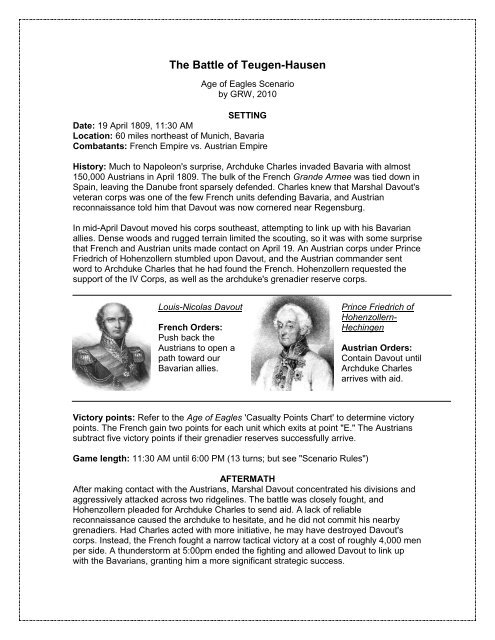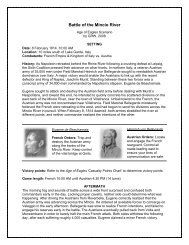BATTLE OF TEUGN-HAUSEN - Free NAPOLEONIC Scenarios
BATTLE OF TEUGN-HAUSEN - Free NAPOLEONIC Scenarios
BATTLE OF TEUGN-HAUSEN - Free NAPOLEONIC Scenarios
You also want an ePaper? Increase the reach of your titles
YUMPU automatically turns print PDFs into web optimized ePapers that Google loves.
The Battle of Teugen-Hausen<br />
Age of Eagles Scenario<br />
by GRW, 2010<br />
SETTING<br />
Date: 19 April 1809, 11:30 AM<br />
Location: 60 miles northeast of Munich, Bavaria<br />
Combatants: French Empire vs. Austrian Empire<br />
History: Much to Napoleon's surprise, Archduke Charles invaded Bavaria with almost<br />
150,000 Austrians in April 1809. The bulk of the French Grande Armee was tied down in<br />
Spain, leaving the Danube front sparsely defended. Charles knew that Marshal Davout's<br />
veteran corps was one of the few French units defending Bavaria, and Austrian<br />
reconnaissance told him that Davout was now cornered near Regensburg.<br />
In mid-April Davout moved his corps southeast, attempting to link up with his Bavarian<br />
allies. Dense woods and rugged terrain limited the scouting, so it was with some surprise<br />
that French and Austrian units made contact on April 19. An Austrian corps under Prince<br />
Friedrich of Hohenzollern stumbled upon Davout, and the Austrian commander sent<br />
word to Archduke Charles that he had found the French. Hohenzollern requested the<br />
support of the IV Corps, as well as the archduke's grenadier reserve corps.<br />
Louis-Nicolas Davout<br />
French Orders:<br />
Push back the<br />
Austrians to open a<br />
path toward our<br />
Bavarian allies.<br />
Victory points: Refer to the Age of Eagles 'Casualty Points Chart' to determine victory<br />
points. The French gain two points for each unit which exits at point "E." The Austrians<br />
subtract five victory points if their grenadier reserves successfully arrive.<br />
Game length: 11:30 AM until 6:00 PM (13 turns; but see "Scenario Rules")<br />
Prince Friedrich of<br />
Hohenzollern-<br />
Hechingen<br />
Austrian Orders:<br />
Contain Davout until<br />
Archduke Charles<br />
arrives with aid.<br />
AFTERMATH<br />
After making contact with the Austrians, Marshal Davout concentrated his divisions and<br />
aggressively attacked across two ridgelines. The battle was closely fought, and<br />
Hohenzollern pleaded for Archduke Charles to send aid. A lack of reliable<br />
reconnaissance caused the archduke to hesitate, and he did not commit his nearby<br />
grenadiers. Had Charles acted with more initiative, he may have destroyed Davout's<br />
corps. Instead, the French fought a narrow tactical victory at a cost of roughly 4,000 men<br />
per side. A thunderstorm at 5:00pm ended the fighting and allowed Davout to link up<br />
with the Bavarians, granting him a more significant strategic success.
SCENARIO RULES<br />
1. This scenario ends at a randomly determined time, simulating the uncertainty of a<br />
coming thunderstorm. Starting on the 4:00pm turn, the player who won initiative should<br />
roll a D6, and on the roll of "1" or "2" the scenario ends due to rain. Continue making this<br />
roll at the start of each subsequent turn. The scenario automatically ends at 6:00pm.<br />
2. The Austrians deploy first, but initiative for the first turn must be rolled.<br />
3. Starting on their 2:00pm turn, the Austrians may request Archduke Charles (who is off<br />
board) release his grenadier reserves. If the request is made, roll a D6 and the request<br />
will be granted on a roll of "1" or "2." All grenadier units will arrive together, under the<br />
direct command of HOHENZOLLERN. If this roll is failed, the Austrian player may repeat<br />
the request at the start of the next turn.<br />
4. DAVOUT is +2 for initiative rolls, and HOHENZOLLERN suffers a -1 modifier.<br />
TERRAIN & WEATHER<br />
The gaming table should be six feet long by four feet wide, laid out according to the<br />
accompanying map. Urban areas offer +1 advantages to defending units in melee and a<br />
-1 benefit when under fire. The streams are fordable, but count as rough going. The<br />
woods block line of sight but do not count as rough going (the woods on this battlefield<br />
are thin, without underbrush). The weather is overcast.<br />
DEPLOYMENT<br />
Units set up according to the accompanying map in whichever formation the commander<br />
sees fit. Batteries may begin limbered or unlimbered, and commanders must be<br />
deployed within 12 inches of their commands.<br />
DAVOUT, the corps commander, begins on the table to start the scenario with SAINT-<br />
HILAIRE's division. Starting 1:00pm (Turn 4) FRIANT arrives at point "B" with one unit of<br />
his division. One additional unit may enter at "B" each subsequent turn. The same<br />
process applies to GUDIN's division, which starts arriving piecemeal at 1:30pm at point<br />
"C." All French Reserve Artillery Batteries arrive at 2:00pm, at point "A." These include<br />
the guns from Saint-Hilaire's division, which were late arriving to the field.<br />
HOHENZOLLERN begins off table with LUSIGNAN's division, and may enter at point "D"<br />
at any time, but only with one brigade at a time. ST. JULIEN begins to arrive at 12:30pm<br />
(Turn 3), also bringing on one unit per turn. The grenadiers of Archduke Charles were<br />
not historically committed. If the Austrian player successfully requests these grenadiers<br />
according to "Special Rule #3", they will arrive at point "D."<br />
SCALE<br />
Each infantry stand represents 360 soldiers, each cavalry stand 180 troopers, and<br />
artillery stands a battery of 6-12 guns. Ground scale is one inch to 150 yards and one<br />
complete turn represents thirty minutes of historical time. This is a two-player scenario.<br />
Notes on Sources<br />
Sources for the Battle of Teugn-Hausen--also known as Thann to the French--are readily<br />
available. The reinforcement schedule was a particularly unique element to the historical<br />
battle, as units arrived piecemeal for both sides throughout the day. This scenario<br />
attempts to recreate that feel, though the game mechanism for doing so is not entirely<br />
historically accurate. See Scott Bowden & Charles Tarbox, Armies on the Danube—<br />
1809 (1989) and James Arnold, Crisis on the Danube (1990).
French Order of Battle<br />
DAVOUT<br />
Grande Armee, III Corps<br />
DAVOUT III Corps ldr<br />
Friant 2nd Division ldr Saint-Hilaire 4th Division ldr<br />
Gilly E 11/8/6 Sk light Lorencez E 12/9/6 Sk line<br />
Grandeau R 6/4/3 Sk line Destabenrath R 9/7/5 Sk line<br />
Hervo R 6/4/3 Sk line<br />
Barbanegre R 6/4/3 Sk line<br />
Light Foot Artillery #1<br />
Light Foot Artillery Reserve #2 & 3<br />
Gudin 3rd Division ldr Heavy Foot Artillery Reserve #5<br />
Petit E 7/5/3 Sk light<br />
Boyer R 11/8/6 Sk line<br />
Duppelin R 11/8/6 Sk line<br />
Light Foot Artillery #4<br />
Austrian Order of Battle<br />
HOHENZOLLERN-HECHINGEN<br />
III Armeekorps<br />
HOHENZOLLERN III Armeekorps ldr<br />
Vukassovich Light Division ldr Lusignan division ldr<br />
M. Liechtenstein R 7/5/4 line Kayser R 12/9/6 line<br />
Pfanzelter R 6/4/3 Sk light Thierry R 12/9/6 line<br />
Ferdinand R 8/6/4 LC hussars Light Foot Artillery #2-4<br />
Light Horse Artillery #1<br />
St. Julien division ldr Heavy Foot Artillery Reserve #6-9<br />
A. Liechtenstein E 12/9/6 line<br />
Bieber R 12/9/6 line (held in reserve by Archduke Charles)<br />
Light Foot Artillery #5 Demontant E 9/6/4 Sk grenadiers<br />
Leiningen E 9/6/4 Sk grenadiers<br />
Georgy E 9/6/4 Sk grenadiers
MAP & DEPLOYMENT
















